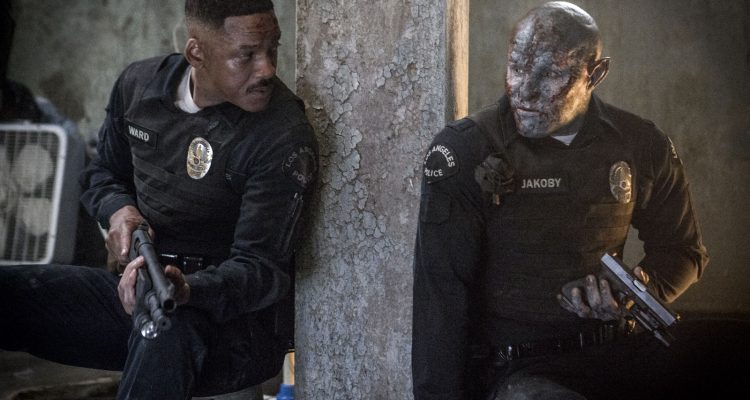If director David Ayer isn’t making an action thriller movie about cops — writing “Training Day,” “Dark Blue” and “S.W.A.T.” and directing “Harsh Times,” “Street Kings” and “End Of Watch” — nearly always centered around the LAPD, gangbangers and crime in South Central LA where he lived for some time, the filmmaker is crafting ultramasculine movies about men with guns (“Sabotage”) and the bonds and battles that bind brotherhood (“Fury”). Aside from “Suicide Squad,” which still features plenty of male posturing and a new breed of super soldiers, law enforcement in one shape or another is the lifeblood that runs through Ayer’s veins.
READ MORE: ‘Bright’ Sequel In The Works At Netflix
The same ideas apply to “Bright,” Ayer’s latest gritty effort, again about street cops risking their lives to patrol the crime-riddled streets of Los Angeles, but turned on its side by the collision of a supernatural mythology created by screenwriter Max Landis (“Chronicle,” “American Ultra”). An urban-fantasy hybrid that mashes up (and retells) Ayer’s “End Of Watch” and “Training Day” with “Lord Of The Rings” sensibilities and spiritually indebted to games like “Legend Of Zelda” and “Shadowrun,” “Bright” is surely, on paper, a distinctive fusion of genres. However, if an alternate present-day reality where ordinary humans, sub-level orcs, affluent elves and fairies have been coexisting since the beginning of time sounds like a dreadful, misguided, ridiculous idea, that’s because it most certainly is. At least in this form and execution.
A mythic, fairytale mess — that kind that makes no fucking sense — it should come with a glossary of terms or a graphic novel to unmuddle itself, but certainly doesn’t. Instead, it’s mostly explained in nearly impenetrable, indecipherable expository babble about legendary battles fought centuries ago. “Bright” centers on two South Central LAPD cops: a hardcore Ward (Will Smith) and the awkward and painfully earnest rookie Jakoby (Joel Edgerton in unrecognizable makeup), an “unblooded” Orc only on the force because of a diversity initiative designed for inclusivity. In this world, Elves essentially run the world, the 1%’ers who basically just shop for designer goods, Fairies are like insects that pester the populace and Orcs are bottom-of-the-barrel, third-class citizens mostly portrayed as lowlife gangbangers (“unblooded” meaning something about not going through an Orc ritual of manhood or something).
“Borrowing the “Lethal Weapon”/”48 Hours” trope of dysfunctional partners forced to work with one another, bad jokes and all, Ward’s life is thrown into disarray when he’s saddled with Jakoby, whom all the other cops detest because of his race (somewhere in the millennia, Orcs made the momentously poor decision to align themselves with a Dark Lord “and they’ve been paying for it ever since”). Worse, since the Orc community looks at Jakoby as a traitor, Ward, who was already shot once due to the Orc’s incompetence, lives life like he has a target on his back.
And then there’s the entire incoherent, tedious main story. The translation of which goes something like: a rare, limitlessly powerful magic wand turns up after eons and a group of rebel Elves known as the Inferni (led by Noomi Rapace) attempt to weaponize it so they can awaken some ancient evil and gain mystical powers. The police officers, involved in another “Training Day”-esque ordeal, stumble upon the wand and must work together to protect a mysterious elf (Lucy Fry) connected to this drama. Then there’s also a prophecy about Brytes, the special, one-in-a-lifetime beings that can actually wield wands, and the Federal Agents in hot pursuit of this dangerous artifact (led by an unintentionally funny-looking Edgar Ramirez playing an especially albino elf).
Risibly shaped like a bad ‘80s sci-fi TV show (think “V” or “Alien Nation”), “Bright” is clumsy and often rather embarrassing. As an obvious allegory about prejudice and tolerance (Fairy Lives Matter too), with themes about the way sins of history forever taint society, and a buddy cop movie about unlikely friendships and moving past differences, “Bright” is a confused disaster of parable, fable and story.
On the surface, the “Bright” mythology is admirably told initially and doesn’t feel the need to patronize. There’s no title card, no flashback, no prelude that spells out this version of civilization to the audience. Fashioned contemporaneously and organically, the viewer simply learns history along the way, which sounds commendable, and would be if the very fabric of the universe wasn’t told through so much janky, impassable expository dialogue.
“Bright” tries to create a unique and dynamic world with the juxtaposition of harsh police life, crime and modern life contrasted with this imaginary magical realm, but it’s contrived, unconvincing and most of all calamitously preposterous. Action scenes are muddled, but perhaps the one element genre fans will take to. But they’re routinely tarnished, especially in the third act, with a blinding supernova of throbbing, outrageously over-the-top melodrama (slow-mo, shouting, every cop cliché in the book and a special dishonorable mention to David Sardy’s overblown score).
Featuring macho, swaggery hip-hop and urban pop that makes transition scenes feel like glossy, tough-guy music video montages, an overlong and baggy pace (an interminable two hours) and largely unfunny jokes, there’s very little, if anything, to recommend in Ayer’s fundamentally ill-conceived hodgepodge of incongruent ideas. Apparently, a sequel to this Middling Earth is in the works, but guys, horse before the cart, please. The prophecies of this fantastical lore speak to special beings, destiny and fate, and here’s my prediction: not a soul, Orc or otherwise is going to enjoy or understand a lick of the execrable “Bright.” [F]

